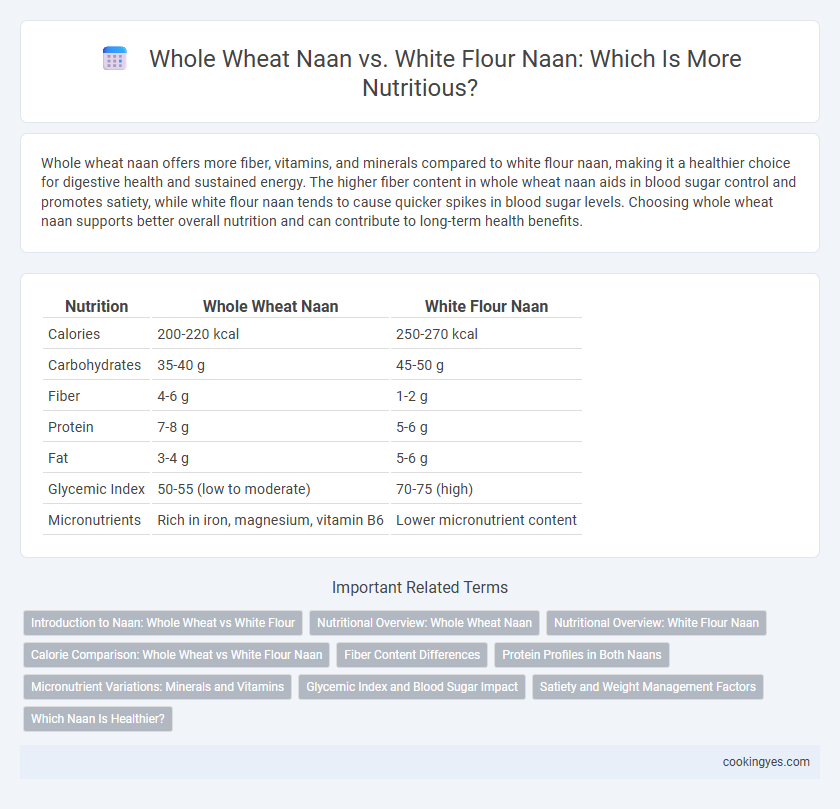Whole wheat naan offers more fiber, vitamins, and minerals compared to white flour naan, making it a healthier choice for digestive health and sustained energy. The higher fiber content in whole wheat naan aids in blood sugar control and promotes satiety, while white flour naan tends to cause quicker spikes in blood sugar levels. Choosing whole wheat naan supports better overall nutrition and can contribute to long-term health benefits.
Table of Comparison
| Nutrition | Whole Wheat Naan | White Flour Naan |
|---|---|---|
| Calories | 200-220 kcal | 250-270 kcal |
| Carbohydrates | 35-40 g | 45-50 g |
| Fiber | 4-6 g | 1-2 g |
| Protein | 7-8 g | 5-6 g |
| Fat | 3-4 g | 5-6 g |
| Glycemic Index | 50-55 (low to moderate) | 70-75 (high) |
| Micronutrients | Rich in iron, magnesium, vitamin B6 | Lower micronutrient content |
Introduction to Naan: Whole Wheat vs White Flour
Whole wheat naan offers higher fiber content, essential vitamins, and minerals compared to white flour naan, making it a healthier choice for digestion and blood sugar control. White flour naan is softer and lighter due to the refined grains but lacks the nutritional benefits of whole wheat, including lower glycemic index and reduced processing. Choosing whole wheat naan supports sustained energy release and better heart health, aligning with whole-food dietary preferences.
Nutritional Overview: Whole Wheat Naan
Whole wheat naan offers higher nutritional value compared to white flour naan, providing more dietary fiber, essential minerals like iron and magnesium, and B vitamins that support metabolism. Its lower glycemic index helps maintain stable blood sugar levels, making it a healthier choice for individuals managing diabetes or weight. Rich in complex carbohydrates and protein, whole wheat naan contributes to sustained energy and improved digestive health.
Nutritional Overview: White Flour Naan
White flour naan is made from refined wheat flour, which results in a softer texture but lower fiber content compared to whole wheat naan. It typically contains fewer vitamins and minerals, such as B vitamins and iron, due to the milling process that removes the bran and germ. While white flour naan provides quick energy from carbohydrates, it lacks the nutritional density and sustained satiety benefits found in whole wheat naan.
Calorie Comparison: Whole Wheat vs White Flour Naan
Whole wheat naan typically contains fewer calories and higher fiber content compared to white flour naan, making it a more nutrient-dense option. The complex carbohydrates in whole wheat naan slow digestion, promoting satiety and stable blood sugar levels. White flour naan, on the other hand, is higher in simple carbohydrates and calories, which may contribute to quicker energy spikes and less sustained fullness.
Fiber Content Differences
Whole wheat naan contains significantly higher dietary fiber compared to white flour naan, with whole wheat providing about 7 grams of fiber per 100 grams, while white flour offers only around 2 grams. The increased fiber in whole wheat naan supports better digestion, aids in blood sugar regulation, and promotes satiety. Choosing whole wheat naan over white flour naan contributes to improved overall nutritional value and sustained energy release.
Protein Profiles in Both Naans
Whole wheat naan contains higher protein content, averaging around 9 grams per 100 grams, compared to white flour naan, which typically has about 7 grams per 100 grams. The protein profile in whole wheat naan includes more complete amino acids due to the presence of bran and germ, enhancing its nutritional value. White flour naan lacks these components, resulting in a less diverse protein composition and lower fiber content.
Micronutrient Variations: Minerals and Vitamins
Whole wheat naan contains higher levels of essential minerals such as iron, magnesium, and zinc compared to white flour naan, enhancing its nutritional value for bone health and immune function. It also offers greater amounts of B vitamins, including folate and niacin, which support energy metabolism and nervous system health. White flour naan is lower in micronutrients due to processing, resulting in reduced vitamin and mineral content despite similar carbohydrate profiles.
Glycemic Index and Blood Sugar Impact
Whole wheat naan has a lower glycemic index (GI) compared to white flour naan, which helps in preventing rapid spikes in blood sugar levels. The higher fiber content in whole wheat naan slows glucose absorption, making it a better option for blood sugar management. White flour naan, with its refined carbohydrates, typically leads to quicker digestion and a more pronounced increase in blood glucose.
Satiety and Weight Management Factors
Whole wheat naan contains higher fiber content and complex carbohydrates compared to white flour naan, promoting greater satiety and prolonged energy release. The increased fiber in whole wheat aids digestion and helps regulate blood sugar levels, making it a better choice for weight management. Choosing whole wheat naan can contribute to reduced hunger pangs and support healthier eating habits.
Which Naan Is Healthier?
Whole wheat naan contains more fiber, vitamins, and minerals compared to white flour naan, making it a healthier choice for digestive health and sustained energy release. White flour naan is typically higher in refined carbohydrates and has a higher glycemic index, which may cause quicker spikes in blood sugar levels. Choosing whole wheat naan supports better blood sugar control and provides more essential nutrients for overall health.
Whole wheat naan vs White flour naan for nutrition Infographic

 cookingyes.com
cookingyes.com